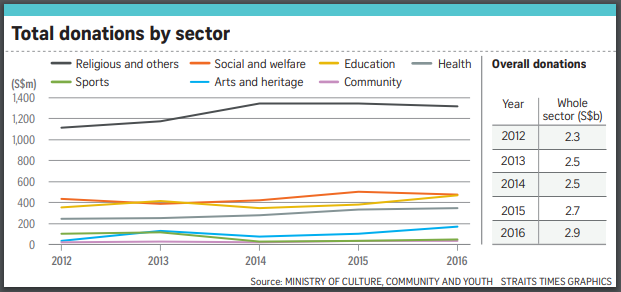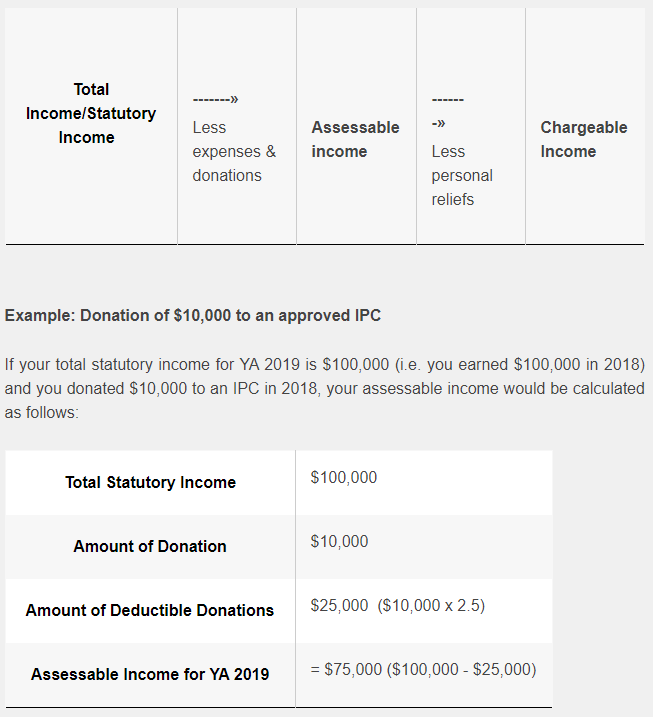The Beneficial Effects of Giving
27 December 2019

“The smallest act of kindness is worth more than the grandest intention.”
– Oscar Wilde
As we approach the end of 2019, it’s good to look back and reflect upon the year. Some of us may recall a time we received an act of kindness. Perhaps it was an unexpected financial gift when we were struggling to make ends meet, or an offer to help out during a busy period, or even just a kind deed or word when we needed it most. We may have blessed others in the same way with our time, talent, or wealth, contributing what we can to make the world a better place.
Interestingly, it seems that Singaporeans are a pretty charitable lot, with giving on the rise. Despite a slight dip in 2018, donations have hovered at very high levels over the past few years. In 2016, donations reached $2.9 billion!

“Singaporeans are generous and there’s no doubt about it,” said Mr Gerard Ee, chairman of the Charity Council. Religious groups such as churches and temples account for more than 33% of the donations, with the rest mainly going towards the education, social and health sectors (see diagram above).
The main reasons for giving included feelings of gratitude over the blessings one had received, as well as the belief that giving was a way to make a positive difference in the world. In addition, people often like donating (surprised?). In an overseas study by the Charities Aid Foundation, 42% of donors highlighted that enjoyment was a big motivation in giving.
So, as you write your new year resolutions, why not make giving a part of it? Here are 3 different benefits of giving that you might be interested to know about:
1. Benefits of Giving – Emotional and Social
Charity benefits not just the recipients but also the donors. There is no shortage of articles about how giving helps us lead significantly happier lives.
Researchers have managed to measure the actual psychological and physiological benefits involved. Things like higher self-esteem, physical health, stress reduction, less negative emotions and increased overall happiness are some outcomes associated with doing acts of charity.
Charity is also a good way for us foster important social connections and strengthen bonds within our community. For example, volunteering helps us interact directly with those we serve, building understanding between different segments of society and ultimately creating a more empathetic and compassionate world.
Volunteering also makes us more aware of the specific issues facing those in need. This makes us more aware of how to donate in ways that will have the greatest positive impact on lives, rather than risk causing unintentional harm. For example, some aid organisations prefer cash donations to food or other supplies, as those can be difficult to manage and regulate for safety and logistical reasons. Cash donations also give the flexibility to purchase the supplies that are most urgently needed at the moment.
2. Benefits of Giving – Financial
Some people may not realise that there are also financial benefits of giving! Even if saving money is not a priority when thinking of giving to help others, tax deductions and other benefits are a valuable component to any wealth management plan, and will also enable you to expand your philanthropic goals and the aid you are able to provide.
There are various forms of donations in Singapore:
- Cash donations to an approved Institution of a Public Character (IPC).
- Gifts of public shares listed on the Singapore Exchange (SGX) or of units in unit trusts traded in Singapore to approved IPCs.
- Gifts of artefacts deemed worthy of collection by the National Heritage Board (NHB) to museums (of approved museum status with the NHB).
- Donations of sculptures or works of art for public display to the National Heritage Board (NHB) or any of its approved recipients.
- Gifts of land or buildings to approved IPCs.
Individuals or corporations who give to charity will receive a 250% tax deduction for qualifying donations. Tax deductions can be large enough to drop you into a lower tax bracket, which can significantly reduce your assessable income. The diagram below from the IRAS website shows a simple way to calculate this:

For more information on claims and the procedures, you can refer to the IRAS webpage on donations.
Apart from the overall tax deduction benefits of donating, individuals with a large collection of illiquid and complex assets, such as art, can be able to unlock their value through these donations.
3. Benefits of Giving – Family Bonding
Lastly, giving to others also helps bring the family together. Research by Indiana University showed that charitably-inclined parents are more likely to have children with the same values, and children of parents who volunteer are more likely to give back in terms of volunteering time with charitable organisations and making financial donations.
Deciding on where and what to donate or engaging in volunteer work as a family can thus be a good way to transmit your important values to the next generation, teaching them gratitude and what they can do to make life easier for the less fortunate.
In conclusion, when you combine your personal values with wealth management strategies, you create a greater sense of purpose and achieve benefits from doing so. You can use this worksheet by Vanguard to kickstart the process of crafting your charitable plan. If you have an excess of funds versus your spending needs, we can also help you design a portfolio that can stretch your giving beyond your lifetime. For more information about advanced charitable giving initiatives and plans, do reach out to us.
On behalf of all of us at GYC, we wish you a Happy and Blessed New Year ahead!
#
If you have found this article useful and would like to schedule a complimentary session with one of our advisers, you can click the button below or email us at customercare@gyc.com.sg.
IMPORTANT NOTES: All rights reserved. The above article or post is strictly for information purposes and should not be construed as an offer or solicitation to deal in any product offered by GYC Financial Advisory. The above information or any portion thereof should not be reproduced, published, or used in any manner without the prior written consent of GYC. You may forward or share the link to the article or post to other persons using the share buttons above. Any projections, simulations or other forward-looking statements regarding future events or performance of the financial markets are not necessarily indicative of, and may differ from, actual events or results. Neither is past performance necessarily indicative of future performance. All forms of trading and investments carry risks, including losing your investment capital. You may wish to seek advice from a financial adviser before making a commitment to invest in any investment product. In the event you choose not to seek advice from a financial adviser, you should consider whether the investment product is suitable for you. Accordingly, neither GYC nor any of our directors, employees or Representatives can accept any liability whatsoever for any loss, whether direct or indirect, or consequential loss, that may arise from the use of information or opinions provided.









